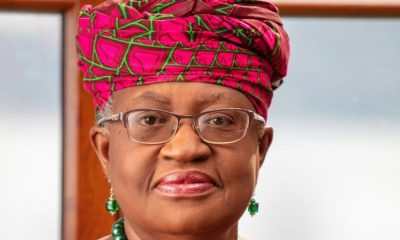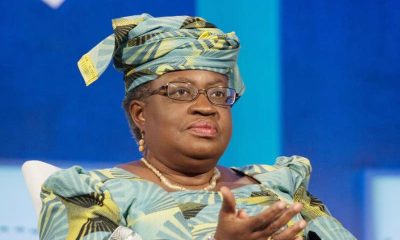Business
Okonjo-Iweala urges Nigeria to begin fossil fuel transition, pledges WTO’s trade assistance
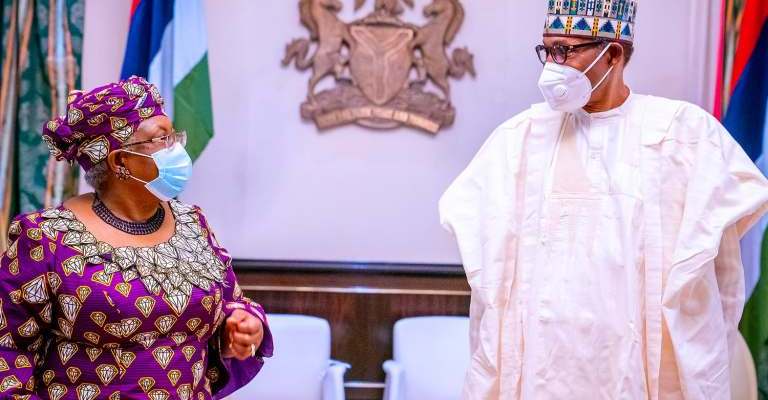
Director-General of the World Trade Organisation, Dr Ngozi Okonjo-Iweala, has expressed the WTO’s willingness to assist the country in surmounting its trade challenges, boost its economy and increase its global share of commerce.
She also spoke on ARISE TV and urged Nigeria to begin to transit from fossil fuel as the world is moving to cleaner energy.
Okonjo-Iweala, on a visit to the country, said agriculture could also boost Nigeria’s share of African trade, currently at about 19 per cent.
She urged the country to exploit the huge potential in the African Continental Free Trade Agreement (AfCFTA) to increase its share of the world trade, stressing that Nigeria’s 0.33 per cent share of global trade is poor.
President Muhammadu Buhari, who received her at the Presidential Villa, Abuja on Monday, attributed her emergence as WTO DG to her past record of performance locally and internationally.
Speaking during separate visits to the Minister of Industry, Trade and Investment, Chief Adeniyi Adebayo, and his Finance, Budget and National Planning counterpart, Mrs. Zainab Ahmed, Okonjo-Iweala expressed WTO’s willingness to assist the country in surmounting limitations to trade in order to increase its global share of commerce.
To achieve that, the former minister for the Economy and Minister of Finance called for value addition to Nigeria’s huge agricultural products for export.
Speaking during separate visits to the Minister of Industry, Trade and Investment, Otunba Adeniyi Adebayo and his Finance, Budget and National Planning counterpart, Mrs. Zainab Ahmed, the WTO DG said, “Nigeria’s share in world trade is 0.33 per cent. This is a very small fraction of what we could do. Our share in African trade is 19 per cent, a little bit higher and below our share of Africa GDP, which is almost a quarter of Africa’s GDP.
“What this means is that we can either look at it negatively or say it is a small portion of what world trade is, or we can turn it around and say it is a glass half full, optimistic side, and say that there is potential for us to do much more. That’s the message I want to convey to the country and Mr. President.
“This means we must step up our action on the economy. We must strive to do better and harder in several ways. The reason we are concerned about that is our youth. Majority of our population are young people who are looking for jobs.”
She added that trade could be instrumental to job creation and economic growth with value addition to products and good logistics to deliver trade.
Okonjo-Iweala further lamented that Nigeria currently ranks 103 out of 167 counties in terms of logistics.
Commending Nigeria for signing on to AfCFTA, the former minister noted that Nigeria accounts for 19 per cent of Africa’s trade, adding that the country could do much better.
The WTO DG called on Nigeria to urgently transit from fossil fuel to renewable energy, saying, “Before we know it, everywhere will be electric cars. So, not only because of trade, but it’s existential for us as a country that we begin to think about what we have.”
She also urged Nigerians not to despair over the current difficulties, adding that the focus should be to identify those areas where there was potential and turn the economy in that direction.
On the fossil fuel transition, she said, “The fact that fossil fuels are being phased out in the world as every country is announcing that as from 2025, 2030, 3040, they would no longer allow the use of fossil fuels; they would not allow cars that burn petrol and is all moving to electric cars and renewables.
“This is huge for the Nigerian economy. It means we’ve to begin thinking of the transition now. Gas is our transition fuel. Some of us are trying to argue for a little more time for countries that depend on gas to have a transition period.
“But it’s inevitably, the way the world is going, we’ve to transition out. And what does that mean? That means we’ve to start thinking what other sectors of the economy are going to bring in revenue to enable us to support imports and exports and create jobs because we’re very dependent on the oil and gas sector now.”
She said her visit was to thank the Federal Government and all Nigerians for the overwhelming support they gave her without which she would not have emerged as the WTO DG as well as to sort out where the organisation could support investments.
Railway
Lagos Govt to redesign Oshodi motor park for rail integration

Lagos Govt to redesign Oshodi motor park for rail integration
The Lagos State Government has announced plans to redesign the Oshodi Transport Interchange (OTI) to integrate the facility with the Red Line and Blue Line rail systems, advancing its Rail Mass Transit project.
This initiative aims to deliver seamless connectivity between the two key rail networks and enhance commuters’ experience in Lagos.
The disclosure was conveyed via a statement shared on the official X (formerly Twitter) account of the Lagos State Ministry of Transportation on Saturday, highlighting the need to optimize the design and operations of the OTI to boost efficiency and align with global standards.
READ ALSO:
- Nurse punished in UK for addressing convicted transgender paedophile as ‘Mr’
- Ex-LG chair challenges El-Rufai’s claims on council funds
- Some ladies in movie industry ready to sleep their way to fame — Jide Kosoko
To kickstart the process, the Honourable Commissioner for Transportation, Seun Osiyemi, held a meeting with stakeholders to assess the current state of the interchange and outline strategies for its improvement.
“The Ministry of Transportation sought to address the ongoing developments and challenges affecting the Oshodi Transport Interchange (OTI) in preparedness for the integration of the Rail Mass transit system; Red Line rail project connecting the Blue Line.
“The Ministry recognized that a review of the OTI’s design and operations is essential for its optimization which led to the Honourable Commissioner for Transportation, Oluwaseun Osiyemi meeting with relevant Stakeholders to discuss the current state of the OTI and identify viable solutions that would enhance its operational efficiency in alignment with global standards and Standard Operating Procedures,” the statement read in part.
Lagos Govt to redesign Oshodi motor park for rail integration
Auto
Nigeria’s firm, Weststar Associates, shines in Dubai, wins Daimler Truck EliteClass award

Nigeria’s firm, Weststar Associates, shines in Dubai, wins Daimler Truck EliteClass award
Weststar Associates Limited, Authorised General Distributor of Daimler Truck in Nigeria, has brought honour home all the way from United Arab Emirates specifically at the EliteClass 2024 Season Awards.
Daimler Truck Middle East Africa the Weststar team with the Silver Award in the Elite CSP (Customer Service and Parts) Performance category.
This is contained in a statement issued in Lagos, which added that the EliteClass 2024 Awards ceremony brought together 40 Daimler Truck Business Partners for a night of recognition and celebration.
Held at the One & Only Royal Mirage in Dubai, the prestigious black-tie event honoured top-performing general distributors that have demonstrated exceptional performance, dedication, and commitment to excellence in 2024.
The EliteClass 2024 Awards C
ceremony was the culmination of a year-long EliteClass programme for the Middle East and Africa measuring 24 categories across the entire business spectrum for Mercedes-Benz Trucks, Daimler Buses, and Fuso Trucks & Bus.
The awards highlighted the dedication and resilience of partners who have achieved outstanding performance and a remarkable commitment to excellence and contributed significantly to Daimler Truck’s success in the MEA regions.
President & CEO of Daimler Truck Middle East Africa, Mr. Michael Dietz, emphasized the importance of collaboration and performance-driven success during his opening address. “EliteClass 2024 is more than just an awards ceremony—it is a testament to the hard work, commitment, and shared vision of our partners.
“Their achievements continue to drive our brand forward, setting new benchmarks in customer experience and operational excellence across the region,” he said.
Weststar’s General Manager, Sales, Mr. Christopher Irumudomon, was present at the EliteClass 2024 Season Awards ceremony to accept the Silver Award in the Elite CSP (Customer Service and Parts) Performance category.
While presenting this award, the Daimler Trucks MEA leadership made the following statement: “Congratulations on your achievement in the EliteClass Central Africa 2024 Season. We are pleased to recognize your individual category achievement.”
The EliteClass 2024 Awards reaffirms Daimler Truck’s commitment to excellence, continuous growth, and the recognition of partners who drive success in an evolving industry landscape.
According to the statement, Weststar Associates Limited continues to fly the flag of the “brand with the star” high in Nigeria.
It said the company had remained the go-to home for all Mercedes-Benz needs in this region.
“With a dealership network that expands to the major regions of the country, along with highly trained and experienced sales and after-sales staff. Nigerians can rest assured that they will always have ‘the best or nothing’ at their disposal,” it stated.
Railway
NRC to revive Lagos 2pm MTTS train as Opeifa tours districts
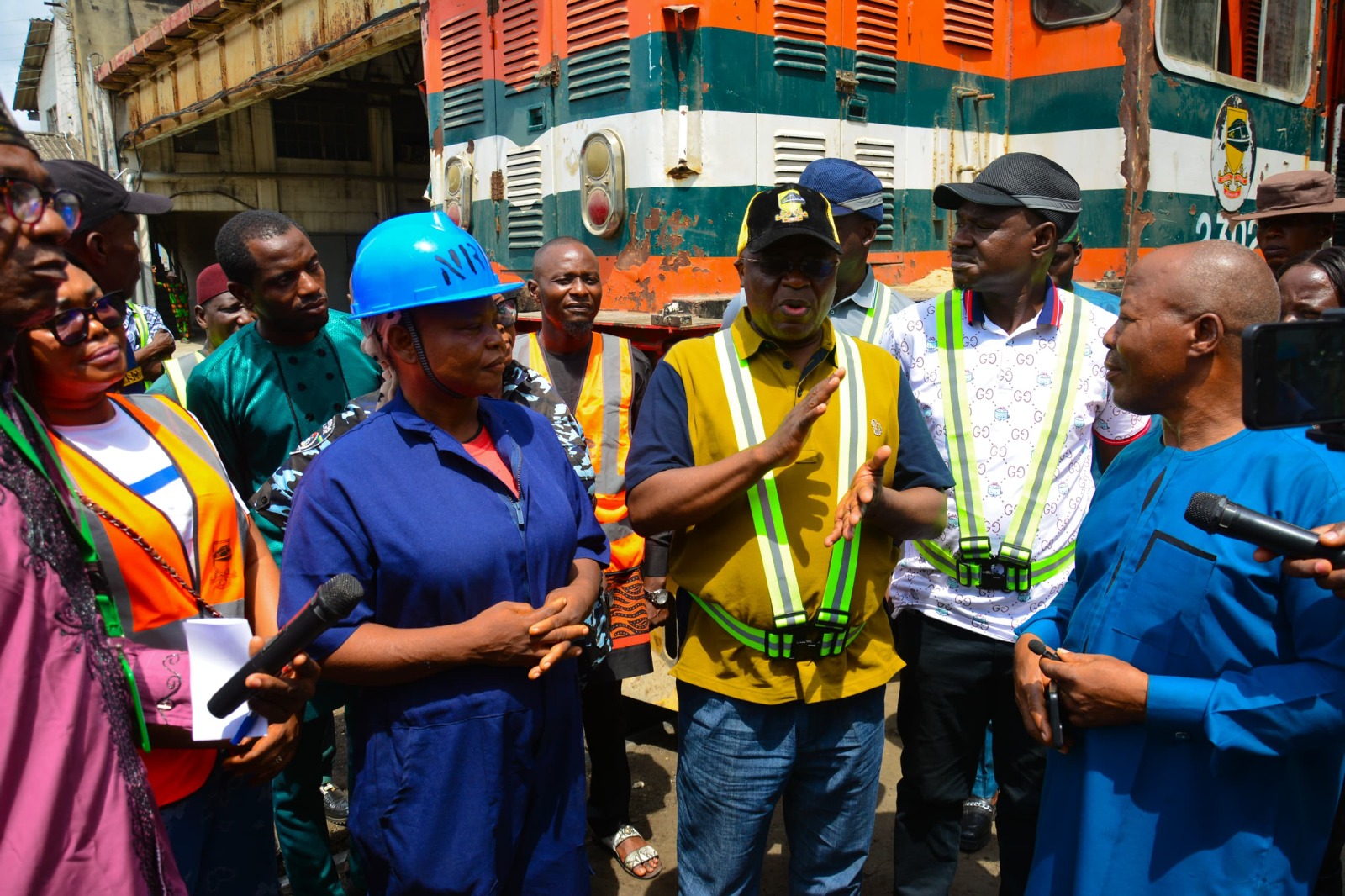
NRC to revive Lagos 2pm MTTS train as Opeifa tours districts
The Nigerian Railwaiy Corporation (NRC) will soon revive its Lagos 2pm mass transit train service (MTTS) in line with the demands of passengers.
Managing Director of the NRC, Dr Kayode Opeifa, disclosed in Lagos, assuring Nigerians of the readiness of the corporation to serve them better.
He spoke at the Iddo Train Station, while addressing train passengers commuting daily from Ijoko and other border communities in Ogun State to Iddo and Idumota axis of the Lagos Island.
A statement by the Deputy Director of Public Relations at the NRC, Mahmood Yakubu, quoted the MD as saying, “NRC management being aware of the centrality of the MTT Kajola to Iddo rail line to the continued prosperity of the Iddo, Idumota and some other big markets in Lagos will not only continue to sustain the line, but work to add addition service after careful commercial market viability and sustainability studies.”
Opeifa was at Iddo Station to assess the available space in preparation for upcoming developmental and revitalization initiatives.
According to him, the transformation of the Iddo Terminal is central to the corporation’s goal to significantly improve the terminal’s infrastructure, optimize its capacity and elevate the passenger experience
He also said the management would urgently embark on the rehabilitation of the coaches to improve the ambience of the interior of the trains and the Iddo stations for better customer experience and patronage.
Opeifa said he would not hesitate to terminate the contract of any contractor not willing or ready to add value to the corporation’s service.
The managing director, who spent some time going round the Iddo Station, also directed the installation of solar panels around the station to better improve the lightening condition, even as he sent the signal that a comprehensive review of all land leases around the station is underway.
Opeifa was nostalgic about the several interesting monuments and railway relics.
He called on corporate organisations and other philanthropists to support the corporation in the area of provision of conveniences for train passengers as part of their corporate social responsibility.
The Railway District Manager (RDM), Engr Augustine Arisa, and District Superintendent, Mrs Chidinma Mba, also informed the MD that the prosperity of the Idumota market is also related to the operations of the MTT line as any day the train does not run, the market feels it.
The NRC MD had earlier commenced his maiden tour of the NRC districts across the country, with a tour to the Running Shed of the corporation at Ebute Metta, which he learnt was a hub to other districts.
He expressed delight at the industry of ironmen (women engineers and technicians) working in the corporation who are competing with their male counterparts in ensuring that all the nation’s rolling assets are in serviceable conditions.
The tour took him to the store, where Opeifa directed that the management must commence the painting of several legacy buildings of the corporation across the country.
He added that the corporation was determined to improve its image as a frontline mobility service provider and the hub for logistics services in the country.
Opeifa who observed that there are no scraps in the railway, reiterated earlier calls on Nigerians to beware of anyone vandalizing the rail materials across the country, adding that security agencies especially the Nigeria Security and Civil Defence Corps (NSCDC) had been directed to prosecute anyone caught vandalizing any rail assets.
He said the corporation would put back to shape as many narrow gauge locomotives still serviceable and would deploy them across the country to serve passenger traffic anywhere the corporation had existing train lines just as the Federal Government would aggressively continue to invest and expand the national standard gauge corridor.
The tour also took the managing director to the Battery Room, as well as the laboratory, an inspection of all the mechanical fluids which was a crucial facility responsible for analyzing the quality and integrity of mechanical fluids used in NRC rail operations.
He assured the laboratory that the management under his watch would continue to support their growth and development as he himself trained and once worked as an analytical chemist.
The tour also took Opeifa to Agege Station where he had a closed door meeting with officials from the Lagos Metropolitan Area Transport Authority (LAMATA), led by the Director Rail Services Engr Olasunkanmi Okusaga, on how to firm up security challenges between the two stations Babatunde Raji Fashola Station and the Lagos State Train Station at Agege Station.
Opeifa who was led round by the Agege Station Manager, Mrs Ese Asowata, went round to check the station’s conveniences, the VIP Lounge, the control room, the ticketing lounge and administrative sections among others.
The managing director took time to address the concerns of some train passengers, one of them, Olatunde Apata, who complained of what could be done for any passenger who missed his train. Apata, who was heading to the Prof. Wole Soyinka Station, in Abeokuta, Ogun State, had missed his train because he went to pray.
Addressing all challenges Opeifa directed that under no circumstances should the ticket not work to relief passengers with disability access the train.
He equally said efforts were being made to see how the issue of those missing their train would be addressed even as he disclosed that the NRC and LAMATA were working at how to ensure passengers could co-switch and access the metro train to continue their journey from the stations.
-

 metro3 days ago
metro3 days ago‘We’re not hiring,’ NNPC denies viral recruitment adverts
-

 metro2 days ago
metro2 days agoNatasha: Court blocks recall attempt, stops INEC
-
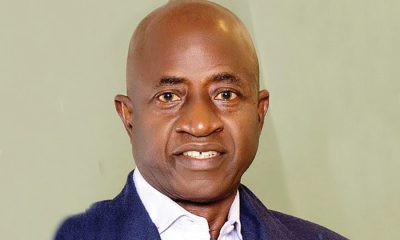
 Sports2 days ago
Sports2 days agoOdegbami speaks on Osimhen breaking his 44-year goals record
-

 Entertainment2 days ago
Entertainment2 days agoI didn’t snatch Asake’s mother from her husband -Musibau Alani
-

 Sports3 days ago
Sports3 days ago2026 WCQ: Super Eagles move up to third place with 2-0 win in Rwanda
-

 Sports3 days ago
Sports3 days agoOsimhen breaks Odegbami’s Eagles goal record
-

 metro2 days ago
metro2 days agoOluwo accuses Ooni of plotting to dethrone him
-

 metro2 days ago
metro2 days agoBoko Haram attacks military base in Adamawa

